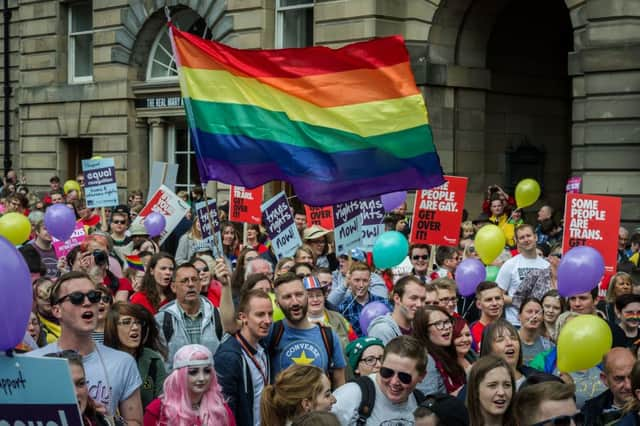Ian Montagu: Scots are displaying a more tolerant streak


Figures from ScotCen’s annual Scottish Social Attitudes (SSA) survey have shown a significant reduction in the prevalence of discriminatory attitudes in Scotland since 2010, with levels of prejudice towards LGBT people in particular falling sharply.
The proportion of people who say that they would be unhappy if a close relative married someone of the same sex has almost halved from 30% in 2010 to 16% in 2015, whilst the number who say they would be unhappy if a relative married someone who has undergone gender reassignment surgery has fallen from around a half to just under a third over the same period. Further, whilst 55% of respondents stated that they would be unhappy if a relative married someone who cross-dresses in public in 2010, 39% were of this inclination in 2015.
Advertisement
Hide AdAdvertisement
Hide AdThe number of people who believe that someone who is gay or lesbian, or has undergone gender reassignment surgery, is unsuitable to be a primary school teacher has also fallen considerably during this timeframe. This shift in attitudes is particularly notable in relation to the latter group; between 2010 and 2015, the proportion of people who said that those who have undergone gender reassignment are not suitable to teach at primary school level fell by 11 percentage points.
These changes have occurred in tandem with a rise in the number of Scots who think that sexual relations between two adults of the same sex are ‘rarely’ or ‘never’ wrong, from 58% in 2010 to 69% in 2015. Taken together, these figures may suggest a broader shift in people’s attitudes towards those who challenge traditional norms of gender, sexuality and relationships.
A closer look at the data shows that the biggest attitudinal change has occurred among those socio-demographic groups that have previously been more likely to hold discriminatory views about LGBT people. Increasing acceptance of a relative marrying a person who has undergone gender reassignment surgery for example has occurred particularly amongst those with no formal educational qualifications, whilst the drop in disapproval of a relative marrying someone of the same sex is also marked amongst those in older age groups who typically hold more socially conservative views. Whilst the drivers behind these changes are complex, it may be the case that those groups amongst which levels of prejudice had previously been comparatively high have been influenced by wider shifts in attitudes across the rest of society.
Despite highlighting the significant progress that has been made towards social equality for LGBT people in Scotland, these figures also show that relatively high levels of prejudice towards certain groups persist, particularly those who cross-dress in public or have undergone gender reassignment surgery. Although positive changes in public attitudes have clearly taken place, there remains work to be done to ensure that no-one in Scotland is subject to discrimination as a result of their sexuality or gender identity.
Ian Montagu is a researcher at ScotCen Social Research
